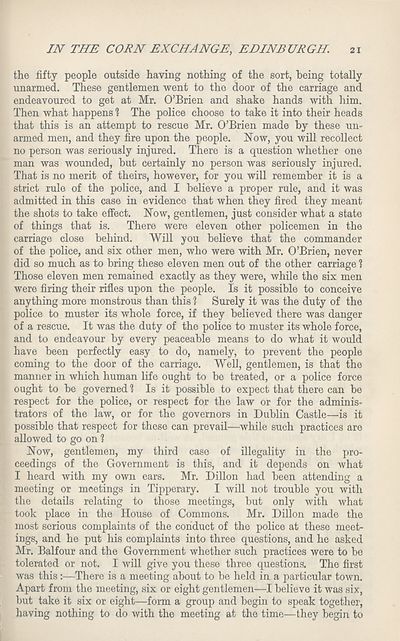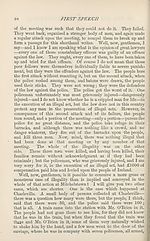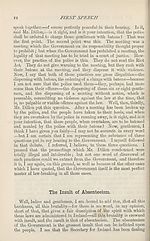Download files
Complete book:
Individual page:
Thumbnail gallery: Grid view | List view

IN THE CORN EXCHANGE, EDINBURGH 21
the fifty people outside having nothing of the sort, being totally
unarmed. These gentlemen went to the door of the carriage and
endeavoured to get at Mr. O’Brien and shake hands with him.
Then what happens 1 The police choose to take it into their heads
that this is an attempt to rescue Mr. O’Brien made by these un¬
armed men, and they fire upon the people. Now, you will recollect
no person was seriously injured. There is a question whether one
man was wounded, but certainly no person was seriously injured.
That is no merit of theirs, however, for you will remember it is a
strict rule of the police, and I believe a proper rule, and it was
admitted in this case in evidence that when they fired they meant
the shots to take effect. Now, gentlemen, just consider what a state
of things that is. There were eleven other policemen in the
carriage close behind. Will you believe that the commander
of the police, and six other men, who were with Mr. O’Brien, never
did so much as to bring these eleven men out of the other carriage 1
Those eleven men remained exactly as they were, while the six men
were firing their rifles upon the people. Is it possible to conceive
anything more monstrous than this 1 Surely it was the duty of the
police to muster its whole force, if they believed there was danger
of a rescue. It was the duty of the police to muster its whole force,
and to endeavour by every peaceable means to do what it would
have been perfectly easy to do, namely, to prevent the people
coming to the door of the carriage. Well, gentlemen, is that the
manner in which human life ought to be treated, or a police force
ought to be governed 1 Is it possible to expect that there can be
respect for the police, or respect for the law or for the adminis¬
trators of the law, or for the governors in Dublin Castle—is it
possible that respect for these can prevail—while such practices are
allowed to go on 1
Now, gentlemen, my third case of illegality in the pro¬
ceedings of the Government is this, and it depends on what
I heard with my own ears. Mr. Dillon had been attending a
meeting or meetings in Tipperary. I will not trouble you with
the details relating to those meetings, but only with what
took place in the House of Commons. Mr. Dillon made the
most serious complaints of the conduct of the police at these meet¬
ings, and he put his complaints into three questions, and he asked
Mr. Balfour and the Government whether such practices were to be
tolerated or not. I will give you these three questions. The first
was this:—There is a meeting about to be held in a particular town.
Apart from the meeting, six or eight gentlemen—I believe it was six,
but take it six or eight—form a group and begin to speak together,
having nothing to do with the meeting at the time—they begin to
the fifty people outside having nothing of the sort, being totally
unarmed. These gentlemen went to the door of the carriage and
endeavoured to get at Mr. O’Brien and shake hands with him.
Then what happens 1 The police choose to take it into their heads
that this is an attempt to rescue Mr. O’Brien made by these un¬
armed men, and they fire upon the people. Now, you will recollect
no person was seriously injured. There is a question whether one
man was wounded, but certainly no person was seriously injured.
That is no merit of theirs, however, for you will remember it is a
strict rule of the police, and I believe a proper rule, and it was
admitted in this case in evidence that when they fired they meant
the shots to take effect. Now, gentlemen, just consider what a state
of things that is. There were eleven other policemen in the
carriage close behind. Will you believe that the commander
of the police, and six other men, who were with Mr. O’Brien, never
did so much as to bring these eleven men out of the other carriage 1
Those eleven men remained exactly as they were, while the six men
were firing their rifles upon the people. Is it possible to conceive
anything more monstrous than this 1 Surely it was the duty of the
police to muster its whole force, if they believed there was danger
of a rescue. It was the duty of the police to muster its whole force,
and to endeavour by every peaceable means to do what it would
have been perfectly easy to do, namely, to prevent the people
coming to the door of the carriage. Well, gentlemen, is that the
manner in which human life ought to be treated, or a police force
ought to be governed 1 Is it possible to expect that there can be
respect for the police, or respect for the law or for the adminis¬
trators of the law, or for the governors in Dublin Castle—is it
possible that respect for these can prevail—while such practices are
allowed to go on 1
Now, gentlemen, my third case of illegality in the pro¬
ceedings of the Government is this, and it depends on what
I heard with my own ears. Mr. Dillon had been attending a
meeting or meetings in Tipperary. I will not trouble you with
the details relating to those meetings, but only with what
took place in the House of Commons. Mr. Dillon made the
most serious complaints of the conduct of the police at these meet¬
ings, and he put his complaints into three questions, and he asked
Mr. Balfour and the Government whether such practices were to be
tolerated or not. I will give you these three questions. The first
was this:—There is a meeting about to be held in a particular town.
Apart from the meeting, six or eight gentlemen—I believe it was six,
but take it six or eight—form a group and begin to speak together,
having nothing to do with the meeting at the time—they begin to
Set display mode to:
![]() Universal Viewer |
Universal Viewer | ![]() Mirador |
Large image | Transcription
Mirador |
Large image | Transcription
| Antiquarian books of Scotland > Politics & government > Political speeches in Scotland in 1890 > (25) |
|---|
| Permanent URL | https://digital.nls.uk/126568590 |
|---|
| Description | Thousands of printed books from the Antiquarian Books of Scotland collection which dates from 1641 to the 1980s. The collection consists of 14,800 books which were published in Scotland or have a Scottish connection, e.g. through the author, printer or owner. Subjects covered include sport, education, diseases, adventure, occupations, Jacobites, politics and religion. Among the 29 languages represented are English, Gaelic, Italian, French, Russian and Swedish. |
|---|

